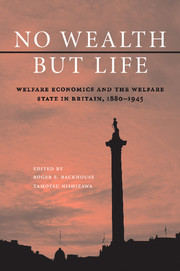Book contents
- Frontmatter
- Contents
- Contributors
- Preface
- 1 Introduction: Towards a Reinterpretation of the History of Welfare Economics
- I CAMBRIDGE WELFARE ECONOMICS AND THE WELFARE STATE
- 2 Marshall on Welfare Economics and the Welfare State
- 3 Pigou's “Prima Facie Case”: Market Failure in Theory and Practice
- 4 Welfare, Taxation and Social Justice: Reflections on Cambridge Economists from Marshall to Keynes
- II OXFORD ETHICS AND THE PROBLEM OF WELFARE
- III WELFARE ECONOMICS IN THE POLICY ARENA
- IV POSTSCRIPT
- Index
- References
4 - Welfare, Taxation and Social Justice: Reflections on Cambridge Economists from Marshall to Keynes
Published online by Cambridge University Press: 06 July 2010
- Frontmatter
- Contents
- Contributors
- Preface
- 1 Introduction: Towards a Reinterpretation of the History of Welfare Economics
- I CAMBRIDGE WELFARE ECONOMICS AND THE WELFARE STATE
- 2 Marshall on Welfare Economics and the Welfare State
- 3 Pigou's “Prima Facie Case”: Market Failure in Theory and Practice
- 4 Welfare, Taxation and Social Justice: Reflections on Cambridge Economists from Marshall to Keynes
- II OXFORD ETHICS AND THE PROBLEM OF WELFARE
- III WELFARE ECONOMICS IN THE POLICY ARENA
- IV POSTSCRIPT
- Index
- References
Summary
INTRODUCTION
The emergence of economics as a separate subject (or Tripos, in Cambridge terminology) created intense debate over its relationship with the existing organization of teaching through the ‘Moral Sciences’ Tripos. John Neville Keynes, the father of John Maynard Keynes, faced considerable mental and emotional anxiety in his attempt to reconcile economic science with ethics and religion. As a young man, he spent much effort attempting to create a philosophy which would unite his nonconformist religion and ethics with political economy. It was very important to him and his friends that economics should involve issues of righteousness and morality. In 1891, his Scope and Method of Political Economy attempted to locate economics in relation to ethics, history and other disciplines – an ambition which ultimately left him disillusioned. By this point, the profession of economics might be said to have divided into two streams, represented by the creation of two journals: the Economic Review and the Economic Journal. Whereas the Review saw economics as an ethical science, the Journal saw it much more as a positive science – a division that lay behind the debate over the place of economics within Cambridge as part of ‘Moral Sciences’ or with a separate Tripos. But the divide should not be exaggerated: many of those who supported the separation of economics into a specialist, positive science continued to give economics an ethical dimension – above all John Maynard Keynes.
- Type
- Chapter
- Information
- No Wealth but LifeWelfare Economics and the Welfare State in Britain, 1880–1945, pp. 62 - 88Publisher: Cambridge University PressPrint publication year: 2010
References
- 3
- Cited by



